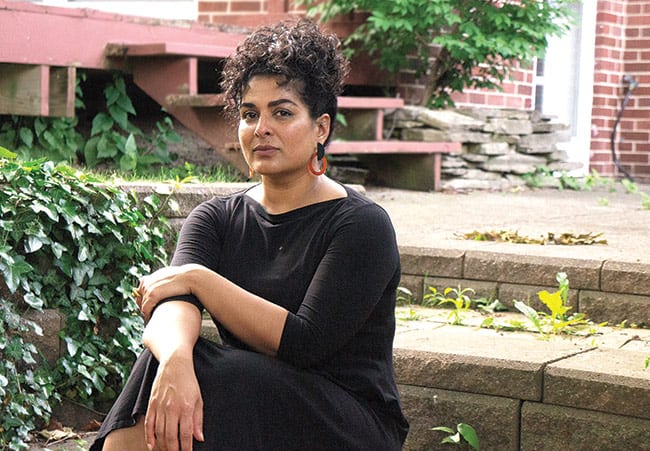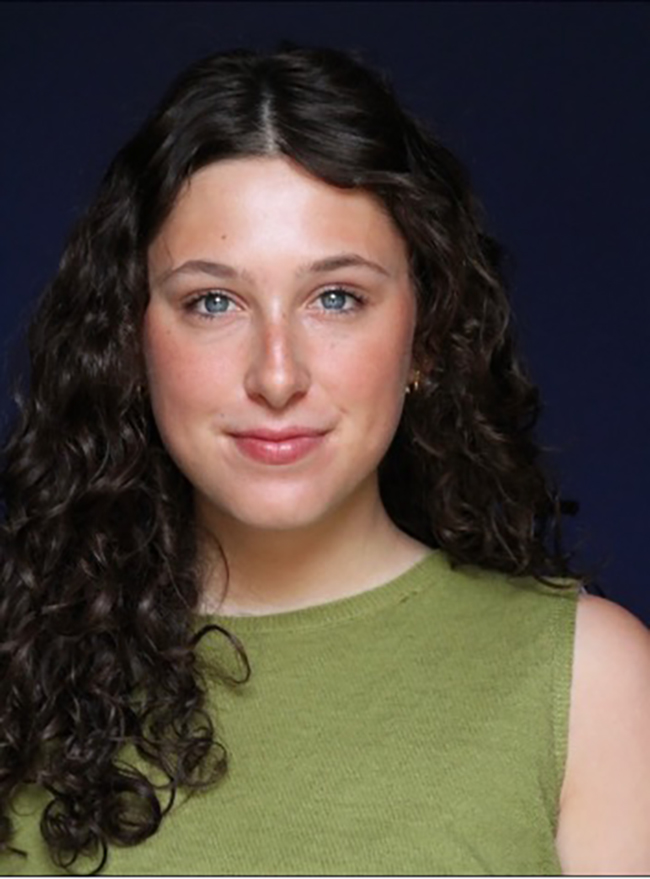Tufts winner believes in the transcendent power of poetry

by Mick Rhodes | mickrhodes@claremont-courier.com
Divya Victor, who on March 4 was named the winner of Claremont Graduate University’s Kingsley Tufts Poetry Award, is a master of not only language, but of its design; her words, the space around them, and the physical documents on which they appear, are all integral to her artform.
Victor’s latest collection, “Curb,” a dazzling treatise on the South Asian immigrant experience in America that combines verse, prose, memoir and history, earned her the coveted Tufts prize, which also includes $100,000.
She, along with torrin a. greathouse, winner of the Kate Tufts Discovery Award, will be in Claremont Wednesday, April 20 to receive their awards during a private ceremony at the home of CGU President Len Jessup. At 6 p.m. Thursday, April 21, they will take part in a public awards reception and reading at the Los Angeles Central Library, 630 W. 5th St., Los Angeles, CA 90071.
Victor, an associate professor of writing and English at Michigan State University, also won the 2022 Pen America Open Book Award for “Curb.”
She was born in India in 1983, migrated to Singapore when she was 11, then to the United States at 18. She became a U.S. citizen, then later accepted a faculty position at a university in Singapore in 2014. She returned to the United States three years later, with her partner and their eight-week-old daughter.
It was 2017. Former President Trump and his administration had recently come to power.
“In my new body as a mother — which is really experienced as an entire new body than the one I had had before becoming a parent — I felt that the kinds of norms of misogyny and racism and xenophobia were intolerable, and could cost us many, many lives,” Victor said. “I felt it as an emergency.
“And I think that I needed that particular body, that had been shaped by survival hormones, I needed that particular body to become alert to the real danger that this administration was advancing on so many people.”
One day around then she took a walk with her mother, and asked her about how she felt about Trump.
“And she said, ‘You know, since you asked: yes, I am afraid all of the time.’ And that’s the poem that begins the book.”
Here is that poem, “
Since you asked”______________________ , since you asked:
yes; I am
afraid all
the time; all
the places are all
the same to me; all
of us are the same to all
of them; this is all
that matters; all
of us don’t matter at all.
In order to write about the South Asian immigrant experience in America, she realized she needed to give the same care and credence to her own mother’s intimate confession as to its centuries’ old history.
“Between those two scales was where I knew I had to operate,” Victor said. “So I think in order for me to navigate that — those two scales — I had to become a mother first. It was like there’s no other body that could have written that book.”
There was anger in the air, and on the airwaves, in post-9/11 America. “Curb” is dedicated to four men of South Asian descent who were killed in the aftermath.
“This book was made to witness the following irreducible facts: these men once lived; they loved; they were loved; the United States of America is responsible for the force of feeling and action that ended their lives,” Victor writes in the introduction. “May their names never be forgotten: Balbir Singh Sodhi, Mesa, Arizona; Navroze Mody, Jersey City, New Jersey; Srinivas Kuchibhotla, Olathe, Kansas; Sunando Sen, Queens, New York.
All were immigrants or children of immigrants, who lived in the United States for a very long time.”
“They lost their lives to xenophobia, anti-immigrant sentiment, and racism,” Victor said. “Essentially I hold the structures of white supremacy, and a long history of xenophobia in this nation, accountable for their lives and their deaths.”
Writing about America’s “othering” of so many South Asians, Arabs, Muslims, and even Hindus following the 9/11 terror attacks was revelatory, Victor said.
“Of course I began to realize that this hostility or this perception of us as dangerous, or as terrorists, had a history dating back to the 1840s,” Victor said. “There was a long history of the ‘fear of the other,’ and then a kind of response to that history of paranoia, which was our own history of fear. And I had to take that fear really quite seriously.”
As she began writing what would become Curb, she became frustrated by the lack literary representation of these changing perceptions of South Asian Americans, and how they had devastated their community following 9/11.
“There were no books out there, no books of poetry, about the grief that we are undergoing, at both our exclusion, and the unacknowledged violence and death against people from our community,” she said. “So I felt that I had an obligation to use my training and my expertise to document this moment, this post 9/11 moment, that has shaped my consciousness and my own identity here in this country.”
Victor has great admiration and evangelical respect for the power of poetry, even in this time of cascading digital interconnectedness, when it feels as if we are all being swamped by endless real-time information. Poetry, she contends, has the ability to slow time down and reshape our attention to language and images.
“And I think when we can slow down and pay attention to how language is working in our world today, we understand out place in it better; because without understanding our place in it, we just feel so often like we’re being tossed around by the world’s events, like we’re helpless and afraid,” Victor said. “And I think that helplessness and that fear can produce a kind of political apathy that many of us struggle with so frequently, I think on a daily basis.
“Poetry for me helps me manage the impacts of feeling helpless and feeling afraid. It helps me reshape that to a kind of political power that I very much would like to retain in myself.”
The art form allows us to bend time, so that we can process the avalanche of information, as well as the historical trail that led us to our current moment, she said.
“So we don’t have to feel history as a force upon the body, but as something that we have helped cause and shape, and that has changed us.”
Victor cited Muriel Rukeyser, June Jordan and Jayne Cortez as poets who wielded language as a
“revolutionary act of documentation” in the 20th and 21st centuries.
“And I think that’s what poetry does for us. It allows me to look into myself and find my power,” Victor said. “And I need that. I need to practice ways of finding my power, because always I’m walking within a society that says to me, ‘You don’t get to have that. You don’t get to keep your power.’
“So in some ways yeah, we’re moving full circle, but when I think about who was allowed to write and read 400 years ago, I was not included in that group of people. So maybe at one point poetry was documenting events, but now I think more of us get to be the documentarians of our time.”
Curb is available from Nightboat Books at https://nightboat.org/book/curb/. All royalties ascribed to Victor from the sale of Curb will be donated equally to The National Queer Asian Pacific Islander Alliance and the South Asian American Digital Archive.
For more information, go to divyavictorcurb.org, or follow @sugaronthegash at Twitter and Instagram.









0 Comments